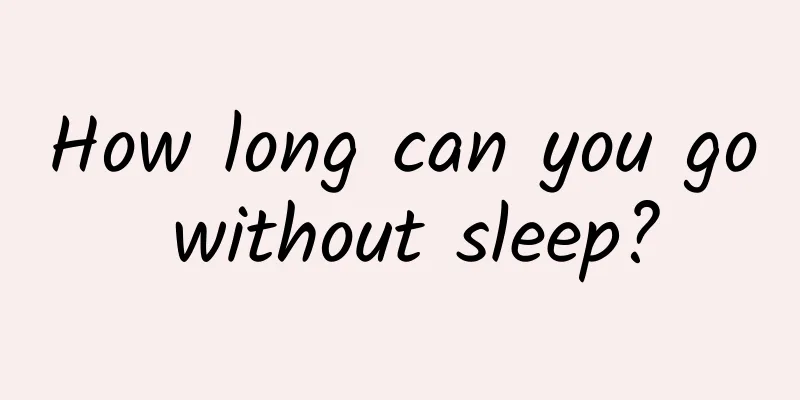How long can you go without sleep?

|
In 1963, 17-year-old Randy Gardner set the world record for the longest time spent awake by going 11 days and 25 minutes without sleep on a high school science fair project in California. Others have reportedly broken the record — Robert McDonald went 18 days and nearly 22 hours without sleep in 1986 — but none were monitored as closely or by doctors as Gardner. Image source: Getty Images The Guinness Book of World Records no longer covers this feat; in 1997 they stopped accepting new submissions due to the "inherent dangers associated with sleep deprivation." But what are these dangers, and what happens to people who are chronically sleep deprived? Sleep is essential for executive, emotional and physical function, and insufficient sleep may increase the risk of several health conditions, including diabetes, heart disease, obesity and depression, according to the Centers for Disease Control and Prevention. Experts say humans need six to eight hours of sleep at equal intervals every 24 hours. But it's not uncommon for people, especially students, to pull all-nighters and stay awake for 24 hours. During this stage of sleep deprivation, it can be challenging to distinguish between sleep and wakefulness, says a sleep medicine researcher at Mount Sinai Hospital in New York City. By the time someone starts going 24 hours without sleep, their brain activity already shows signs that they are at the sleep-wake boundary, even if they appear to be awake. This is called a sleep intrusion or microsleep. People who forgo hours of sleep appear awake, but their brains involuntarily enter an abnormal sleep state that may include intermittent periods of inattention or hallucinations. But sleep takes over and the brain inevitably returns to sleep. When someone tells me “I haven’t slept in weeks,” it’s almost impossible. I find it hard to believe that someone can stay awake for more than 24 hours without these episodes. But exactly how long people can go without sleep, and the timeline of side effects, is hard to determine. Chronic sleep deprivation is devastating when a person goes without sleep for long periods of time, and it is unethical to study in humans. It has even been used as a form of psychological torture. While it is not possible to study long-term sleep deprivation, we do have data on patients with a rare genetic disorder called fatal familial insomnia (FFI). These patients have a gene mutation that causes an abnormal protein to accumulate in the brain and gradually worsen sleep. Their bodies begin to deteriorate and they eventually die as the abnormal protein accumulates and damages their brain cells. Most patients die within an average of 18 months. In animals, a 1989 study on mice showed that the animals died after only 11 to 32 days without sleep. A 2019 human study published in Nature and Sleep Science found that participants had relatively normal alertness and vigilance after 16 hours of sleep deprivation. But after 16 hours, their concentration decline increased significantly, and it was even worse in participants with chronic insomnia. A 2000 study found that 24 hours without sleep reduced hand-eye coordination by the equivalent of a 0.1% blood alcohol content. The effects of 24 hours of sleep deprivation include decreased reaction time, slurred speech, impaired decision-making, decreased memory and concentration, irritability, impaired vision, hearing and hand-eye coordination, and tremors, according to the Cleveland Clinic. People who get less than 36 hours of sleep may have increased inflammatory markers in their blood, and even experience hormone imbalances and slower metabolism. But exactly how long people can go without sleep, and the timeline of side effects, is hard to determine. Chronic sleep deprivation is devastating when a person goes without sleep for long periods of time, and it is unethical to study in humans. It has even been used as a form of psychological torture. While it is not possible to study long-term sleep deprivation, we do have data on patients with a rare genetic disorder called fatal familial insomnia (FFI). These patients have a gene mutation that causes an abnormal protein to accumulate in the brain and gradually worsen sleep. Their bodies begin to deteriorate and they eventually die as the abnormal protein accumulates and damages their brain cells. Most patients die within an average of 18 months. In animals, a 1989 study on mice showed that the animals died after only 11 to 32 days without sleep. A 2019 human study published in Nature and Sleep Science found that participants had relatively normal alertness and vigilance after 16 hours of sleep deprivation. But after 16 hours, their concentration decline increased significantly, and it was even worse in participants with chronic insomnia. A 2000 study found that 24 hours without sleep reduced hand-eye coordination by the equivalent of a 0.1% blood alcohol content. The effects of 24 hours of sleep deprivation include decreased reaction time, slurred speech, impaired decision-making, decreased memory and concentration, irritability, impaired vision, hearing and hand-eye coordination, and tremors, according to the Cleveland Clinic. People who get less than 36 hours of sleep may have increased inflammatory markers in their blood, and even experience hormone imbalances and slower metabolism. Source: Chongqing Tianji Network Co., Ltd. Source: Live Science "How long can you go without sleep?" Statement: Except for original content and special notes, some pictures are from the Internet. They are not for commercial purposes and are only used as popular science materials. The copyright belongs to the original authors. If there is any infringement, please contact us to delete them. |
<<: Is it necessary to wear a sports bra when exercising? What will happen if you don't?
>>: Are cramming exercise methods VS regular exercise really equally effective?
Recommend
International Women's Day: A spiritual care guide for women
Today is International Women's Day, which is ...
Why do I bleed again a week after my period ends?
Why does bleeding occur again one week after the ...
Do women still ovulate after menopause? The truth is this
Many women will ask a question online: they have ...
Why don’t follicles grow bigger?
The development of female follicles is mainly div...
What happens when ovulation turns from strong positive to weak positive?
When women are preparing for pregnancy, they need...
What novel is "Snow Pear Stewed in Rock Sugar" based on? Where can I read the novel "Snow Pear Stewed in Rock Sugar"?
With the extension of the holiday, more and more ...
Can I eat enzyme plum during menstruation?
It is not recommended to eat enzyme plums during ...
Should I use milk or yogurt for a milkshake? What fruits can I add to a milkshake?
Milkshakes have always been loved by many people....
Why do I have calf pain during confinement?
After giving birth, a woman definitely needs to r...
The reason why a woman suffers from heel pain
I believe that many people have experienced heel ...
Diabetics should be prescribed to "walk"! Italian guidelines
Recently, two Italian societies conducted a syste...
What causes black blood clots during menstruation?
Irregular menstruation is particularly troublesom...
Dreaming about pregnant women
What does it mean to dream about a pregnant woman...
[Healthy Life] In addition to Mycoplasma pneumoniae, you should also pay attention to these infectious diseases
Recently, the number of outpatient and emergency ...









